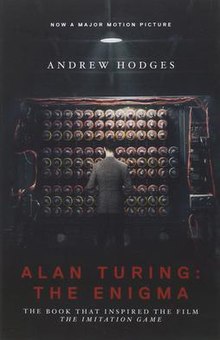Alan Turing: The Enigma
 Cover for the movie tie-in edition | |
| Author | Andrew Hodges |
|---|---|
| Country | United Kingdom |
| Language | English |
| Subject | Alan Turing (1912–1954) |
| Genre | Biography |
| Published | 1983 (Burnett Books/Hutchinson, UK & Simon & Schuster, USA) |
| Media type | Print (hardcover, paperback, audio) |
| Pages | 587 |
| ISBN | 0-671-49207-1 |
| OCLC | 11516745 |
| 510.92 | |
| LC Class | QA29.T8H63 |
Alan Turing: The Enigma (1983) is a biography of the British mathematician, codebreaker, and early computer scientist, Alan Turing (1912–1954) by Andrew Hodges. The book covers Alan Turing's life and work. The 2014 film The Imitation Game is loosely based on the book, with dramatization.
Editions[edit]
The following editions of the book exist:[1]
- Hardback
- UK: Burnett Books/Hutchinson (1983)
- US: Simon & Schuster (1983)
- Paperback
- UK: Counterpoint (Alan Turing: The Enigma of Intelligence, without photographs)
- US: Touchstone Books
- UK: Vintage Books (1992–2012, including the 2012 centenary edition)
- US: Walker Books (2000–2005)
- US: Princeton University Press (2014)
New editions appeared in 2012, for the centenary of Turing's birth, and 2014, the year the film The Imitation Game was released.[2]
- Audio
- Audible.co.uk (30-hour recording)[3]
Reviews[edit]
The book has been widely reviewed by newspapers and magazines[1] including The Guardian, The Independent,[4] Los Angeles Times, Nature, New Statesman, New Yorker, The New York Times, Notices of the American Mathematical Society, Physics Today,[5] Sunday Times, Time Out, Times Literary Supplement, The Wall Street Journal.[6]
Influence[edit]
The book inspired the 2014 film The Imitation Game, directed by Morten Tyldum and starring Benedict Cumberbatch and Keira Knightley.
See also[edit]
- The Annotated Turing (2008)
- Prof: Alan Turing Decoded (2015)
- The Turing Guide (2017)
References[edit]
- ^ a b "Alan Turing: The Enigma". www.turing.org.uk. Retrieved 3 August 2017.
- ^ "Alan Turing: The Enigma – The Book That Inspired the Film The Imitation Game – Andrew Hodges". UK: Penguin. 13 November 2014. Archived from the original on 9 January 2017. Retrieved 4 August 2017.
- ^ "Alan Turing: The Enigma". Audible.co.uk. Audible Inc. Retrieved 3 August 2017.
- ^ Hirst, Christopher (15 June 2012). "Alan Turing: The Enigma, By Andrew Hodges". The Independent. Archived from the original on 17 June 2012.
- ^ Sayre, David (November 1984). "Review of Alan Turing: The Enigma by Andrew Hodges". Physics Today. 37 (11): 107–108. doi:10.1063/1.2915935. p. 107 p. 108
- ^ McKay, Sinclair (9 November 2012). "On ciphers and codebreakers during World War II and after". The Wall Street Journal.
